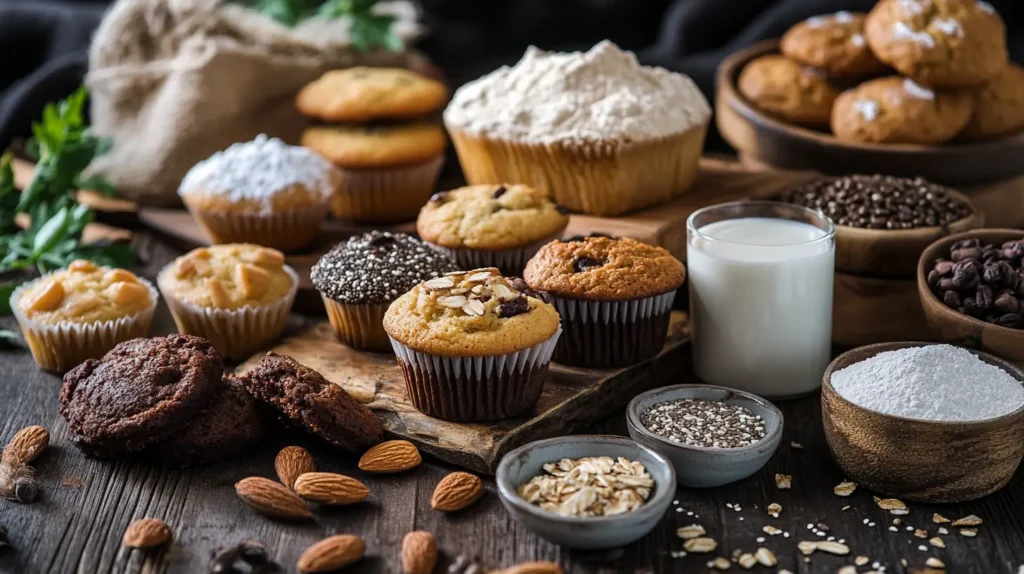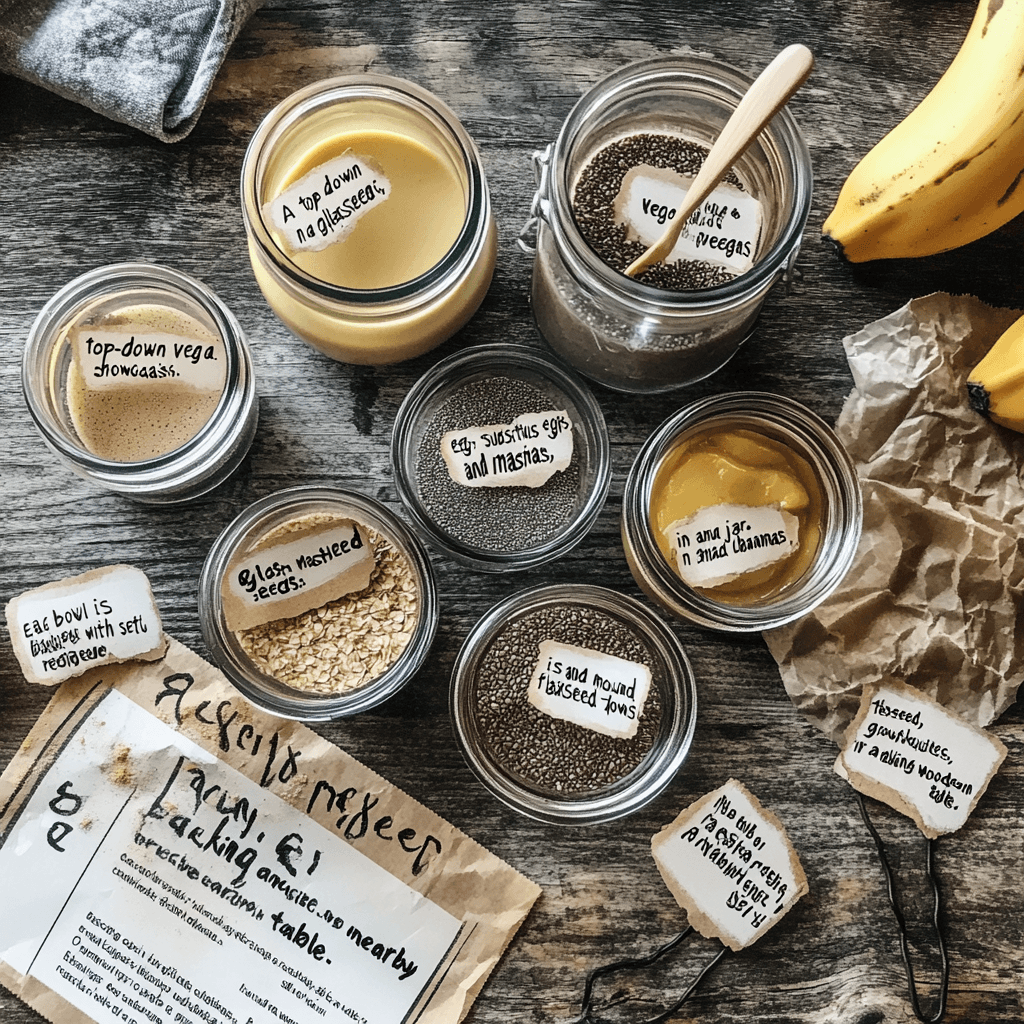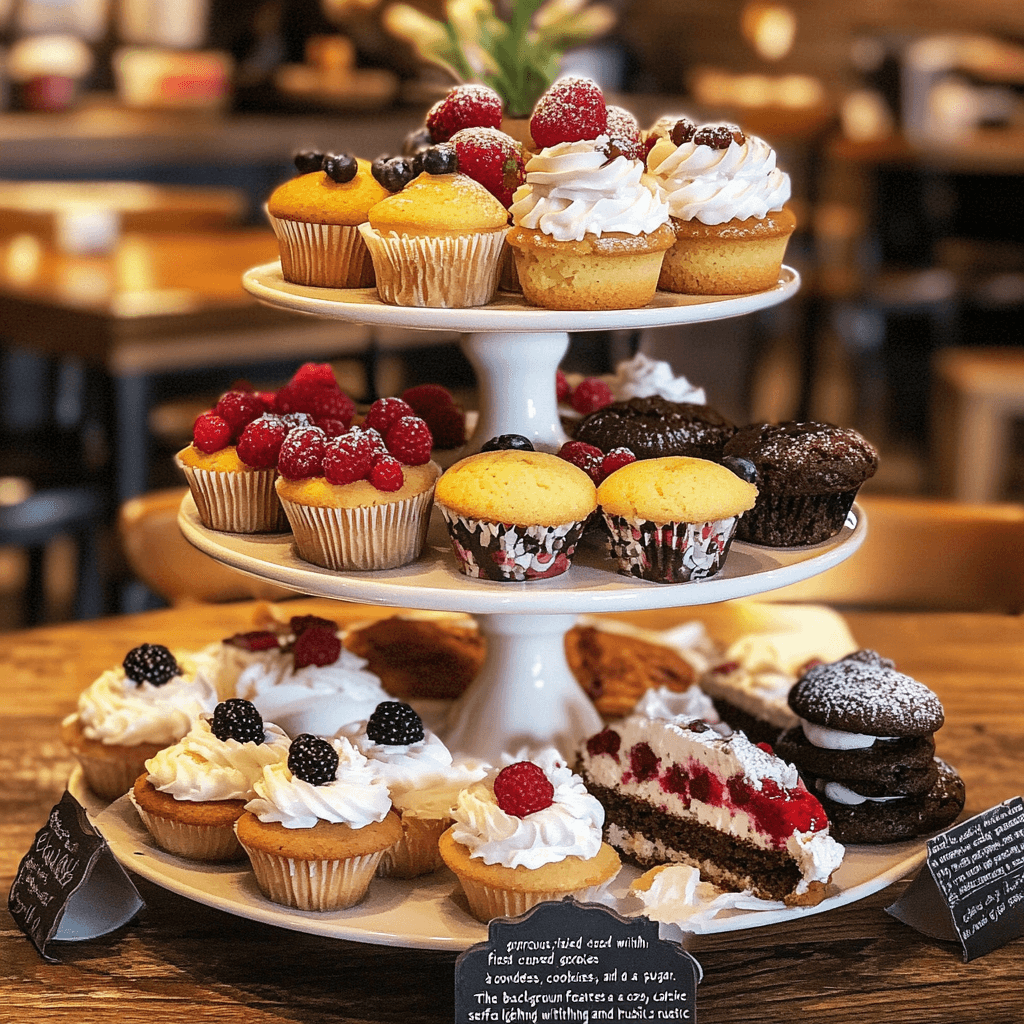Vegan baking has seen a surge in popularity in recent years, driven by growing awareness of plant-based diets and a desire for sustainable and cruelty-free food choices. This method of baking eliminates the use of animal-derived ingredients, offering a creative and inclusive approach to traditional recipes. Whether you’re a seasoned baker or a novice, exploring vegan baking can open the door to healthier, innovative, and environmentally friendly desserts and pastries.

Table of Contents
The Rise of Vegan Baking
The rise of vegan baking reflects broader trends in dietary preferences and sustainability. As more individuals adopt plant-based lifestyles, the demand for vegan-friendly desserts has skyrocketed. This movement is fueled by a combination of ethical considerations, health benefits, and environmental awareness.
Ethically, vegan baking aligns with a commitment to reducing animal exploitation by avoiding eggs, butter, milk, and other animal-derived products. Health-conscious consumers are also drawn to the nutritional benefits of using whole grains, natural sweeteners, and plant-based fats, which often feature prominently in vegan recipes. Additionally, plant-based baking significantly reduces the carbon footprint, as the production of plant-based ingredients requires fewer resources compared to animal agriculture.
Vegan bakeries, cookbooks, and online recipes have flourished, making it easier than ever for enthusiasts to find inspiration. Social media platforms also play a significant role in popularizing vegan treats, with visually stunning creations captivating audiences worldwide.
What Makes Baking Vegan-Friendly?
At its core, vegan baking involves substituting traditional animal-based ingredients with plant-based alternatives while maintaining the taste, texture, and functionality of the final product. Key principles include:
Egg Replacements
Eggs provide structure, leavening, and moisture in traditional baking, but vegan alternatives like flaxseeds, chia seeds, applesauce, mashed bananas, or commercial egg replacers achieve similar results. For instance, a “flax egg” made from ground flaxseed and water works well in cookies and cakes.
Dairy Substitutes
Instead of cow’s milk, plant-based options like almond, soy, oat, or coconut milk can be used. Vegan butter alternatives, such as margarine or coconut oil, replace traditional butter, while products like cashew cream or silken tofu create rich textures in frostings and fillings.
Sweeteners and Thickeners
Many conventional sweeteners, such as refined white sugar, may be processed with animal products like bone char. Vegan-friendly options include organic sugar, maple syrup, agave nectar, and coconut sugar. Thickeners like agar-agar or tapioca starch replace gelatin in vegan recipes.
Flour and Leavening Agents
Flour and baking powders are naturally vegan, but it’s essential to ensure they are free of additives like L-cysteine (an animal-derived dough conditioner). Whole-grain or gluten-free flours can also enhance the nutritional profile of vegan baked goods.
Innovative Ingredients
Vegan baking often introduces creative ingredients, such as aquafaba (the liquid from canned chickpeas) for meringues, or nutritional yeast for savory pastries. These unique elements highlight the adaptability and ingenuity of plant-based baking.
By mastering these substitutions, anyone can transform traditional recipes into vegan-friendly versions without compromising flavor or quality. Vegan baking offers endless opportunities to innovate while aligning with a sustainable and compassionate lifestyle.
Essential Substitutes for Eggs

Eggs are a staple in traditional baking, serving as binders, leavening agents, and moisture providers. However, for vegan bakers or those with egg allergies, there are numerous substitutes that can achieve similar results. Understanding these alternatives and their benefits can help you create delectable baked goods that are entirely plant-based.
Egg Replacers in Vegan Baking
In vegan baking, egg replacers are used to mimic the functional properties of eggs without relying on animal products. Each substitute works best for specific types of recipes, depending on the role eggs play in the dish. For instance, some replacements are better for binding ingredients, while others are ideal for leavening or adding moisture.
Common Egg Substitutes
Here are some of the most widely used egg alternatives in vegan baking, categorized by their primary functions:
- Flaxseed Meal (Flax Egg)
- How to Use: Mix 1 tablespoon of ground flaxseed with 2-3 tablespoons of water; let it sit for 5 minutes until it thickens.
- Best For: Cookies, muffins, pancakes.
- Why It Works: The mucilaginous quality of flaxseed acts as a binder, providing structure to baked goods.
- Chia Seeds
- How to Use: Similar to flaxseed, mix 1 tablespoon of chia seeds with 2-3 tablespoons of water; let it gel.
- Best For: Cakes, quick breads, waffles.
- Why It Works: Its gel-like texture helps bind ingredients while retaining moisture.
- Applesauce
- How to Use: Replace ¼ cup of applesauce for each egg.
- Best For: Brownies, cakes, muffins.
- Why It Works: Adds moisture and subtle sweetness, though it may slightly alter the flavor.
- Mashed Bananas
- How to Use: Replace ¼ cup of mashed banana for each egg.
- Best For: Sweet breads, pancakes, dense cakes.
- Why It Works: Provides binding and moisture but may impart a banana flavor.
- Aquafaba
- How to Use: Use 3 tablespoons of the liquid from canned chickpeas as a replacement for one egg. Whip it for airy recipes.
- Best For: Meringues, mousses, macarons.
- Why It Works: Its protein content and ability to trap air mimic the properties of egg whites.
- Silken Tofu
- How to Use: Blend ¼ cup of silken tofu until smooth for each egg.
- Best For: Cheesecakes, dense brownies, quiches.
- Why It Works: Adds creaminess and moisture without altering flavor significantly.
- Commercial Egg Replacers
- How to Use: Follow package instructions (usually a powder mixed with water).
- Best For: Versatile; can be used in most baked goods.
- Why It Works: Specially formulated to replicate egg functions in baking.
Benefits of Egg Alternatives in Vegan Recipes
Switching to egg substitutes in vegan recipes offers several advantages:
- Health Benefits: Many egg alternatives, like flaxseeds and chia seeds, are nutrient-dense, providing omega-3 fatty acids, fiber, and antioxidants. They are also cholesterol-free, making them a heart-healthy choice.
- Dietary Inclusion: Using egg replacers makes baked goods accessible to people with egg allergies or dietary restrictions, broadening their appeal.
- Sustainability: Egg alternatives are often more environmentally friendly, as their production has a smaller carbon footprint compared to traditional egg farming.
- Cost-Effectiveness: Common substitutes like applesauce, bananas, and aquafaba are affordable and readily available, reducing baking costs.
- Innovation in Baking: Experimenting with egg replacers encourages creativity, allowing bakers to discover new flavors and textures that enhance traditional recipes.
Vegan Flours and Their Alternatives
Flour is a fundamental ingredient in baking, providing structure, texture, and flavor. While traditional all-purpose flour is plant-based, vegan bakers often explore alternative flours for health, dietary, and environmental reasons. From gluten-free options to nutrient-rich varieties, the world of vegan flours offers endless possibilities for creative and wholesome baking.
All-Purpose Flour vs. Vegan Flour
All-purpose flour is a versatile and commonly used option in baking. While it is inherently vegan, its nutritional profile and processing methods may not align with every vegan’s preferences. For instance, some vegans prefer minimally processed, whole-grain options to boost fiber and nutrient content in their recipes.
Vegan flours, such as almond flour, coconut flour, or oat flour, are plant-based alternatives that cater to specific dietary needs. These flours often provide unique flavors, textures, and nutritional benefits, making them suitable for diverse recipes and dietary goals.
Gluten-Free Vegan Baking
Gluten-free baking introduces additional challenges as gluten is a key protein that provides elasticity and structure in traditional baking. Vegan gluten-free flours typically require binders or thickeners, such as xanthan gum, psyllium husk, or flaxseeds, to replicate these properties. Some popular gluten-free vegan flours include:
- Almond Flour
- Made from finely ground almonds, this flour is high in protein and healthy fats.
- Best For: Cookies, cakes, and pie crusts.
- Texture: Adds a soft, moist texture with a slightly nutty flavor.
- Coconut Flour
- Made from dried coconut meat, this flour is high in fiber but absorbs significant moisture.
- Best For: Pancakes, muffins, and dense cakes.
- Texture: Creates a rich, dense product but requires additional liquid or eggs in recipes.
- Oat Flour
- Ground from oats, this flour is gluten-free (if certified) and rich in fiber.
- Best For: Quick breads, cookies, and pancakes.
- Texture: Softens baked goods while adding a mild, slightly sweet flavor.
- Rice Flour
- A fine flour made from white or brown rice, often used in gluten-free blends.
- Best For: Cakes, crackers, and shortbreads.
- Texture: Provides a light, airy consistency but may need a binder.
- Chickpea Flour
- Made from ground chickpeas, this flour is high in protein and has a savory flavor.
- Best For: Flatbreads, savory crepes, and fritters.
- Texture: Dense and hearty, works well in savory vegan recipes.
Best Flours for Vegan Baking
Choosing the best flour depends on the recipe, desired texture, and nutritional goals. Here are some of the top choices for vegan baking:
- Whole Wheat Flour
- A minimally processed alternative to all-purpose flour, offering more nutrients and fiber.
- Best For: Bread, muffins, and cookies.
- Benefits: Adds a nutty flavor and a denser texture.
- Spelt Flour
- An ancient grain flour with a mild, slightly sweet flavor.
- Best For: Pastries, cookies, and bread.
- Benefits: Easier to digest than wheat flour and rich in nutrients.
- Buckwheat Flour
- Despite its name, buckwheat is gluten-free and offers a bold, nutty flavor.
- Best For: Pancakes, waffles, and rustic bread.
- Benefits: High in protein, antioxidants, and fiber.
- Teff Flour
- A tiny grain with Ethiopian origins, known for its high iron and protein content.
- Best For: Flatbreads, cookies, and cakes.
- Benefits: Adds a mildly nutty, earthy flavor.
- Cassava Flour
- Made from the whole root of the cassava plant, this flour is gluten-free and nut-free.
- Best For: Tortillas, cakes, and cookies.
- Benefits: Mimics the texture of wheat flour in many recipes.
Plant-Based Fats in Vegan Baking
Fats are essential in baking, contributing to flavor, moisture, and the desired texture of baked goods. In vegan baking, plant-based fats are used to replace traditional animal-derived fats like butter and lard. These substitutes not only align with ethical and dietary choices but also provide a variety of options for healthier and creative recipes.
Vegan Butter and Margarine
Vegan butter and margarine are popular replacements for traditional dairy butter, offering similar functionality in recipes while being entirely plant-based. Here’s what you need to know:
Vegan Butter
- Composition: Made from plant oils like coconut, avocado, or sunflower oil, often blended with emulsifiers and natural flavorings.
- Uses: Ideal for baking cookies, cakes, and pastries where the flavor and texture of butter are critical.
- Advantages: Provides a buttery flavor and consistency that closely resembles traditional butter.
- Brands: Many commercial brands now offer high-quality vegan butters specifically designed for baking.
Margarine
- Composition: A spreadable product made from plant oils, fortified with vitamins, and often less expensive than vegan butter.
- Uses: Works well in recipes that require fat as a binder or for spreading on baked goods.
- Advantages: Readily available and versatile, but choose trans-fat-free options for health considerations.
- Note: Always check labels to ensure margarine is dairy-free, as some may contain trace amounts of animal-derived ingredients.
The Role of Oils in Vegan Baking
Plant-based oils are another cornerstone of vegan baking, providing moisture and richness. Each oil has unique properties that can influence the flavor, texture, and nutritional profile of baked goods.
Common Oils and Their Uses
- Coconut Oil
- Properties: Solid at room temperature, it mimics butter in texture and richness.
- Best For: Cookies, pie crusts, and frostings.
- Flavor: Adds a subtle coconut taste unless refined coconut oil is used.
- Olive Oil
- Properties: Liquid at room temperature, adds moisture and a fruity flavor.
- Best For: Savory breads, muffins, and cakes.
- Flavor: Extra virgin olive oil imparts a strong taste, while light olive oil is milder.
- Avocado Oil
- Properties: Neutral flavor, high smoke point, and rich in healthy fats.
- Best For: Cakes, brownies, and any recipe requiring a neutral oil.
- Advantages: Offers nutritional benefits without overpowering other flavors.
- Canola Oil
- Properties: Neutral flavor and affordable.
- Best For: Everyday baking, including quick breads, cookies, and cakes.
- Advantages: Works well as a one-to-one replacement for melted butter.
- Sunflower Oil
- Properties: Neutral taste and rich in vitamin E.
- Best For: Light cakes, cupcakes, and delicate pastries.
- Advantages: Suitable for recipes where other flavors should shine.
Benefits of Oils in Vegan Baking
- Moisture: Oils create soft, moist textures in cakes, muffins, and breads.
- Ease of Use: Unlike solid fats, oils are easy to measure and incorporate into recipes.
- Healthier Options: Many plant-based oils are high in unsaturated fats, offering heart-healthy alternatives to animal-based fats.
Tips and Tricks for Perfect Vegan Bakes
Vegan baking can be incredibly rewarding, but it comes with its unique set of challenges. From mastering substitutions to refining techniques, a little guidance can go a long way in creating consistently delicious plant-based baked goods. This guide covers common mistakes to avoid and essential tools for every vegan baker.
Common Mistakes in Vegan Baking and How to Avoid Them
1. Incorrect Substitution Ratios
- Mistake: Replacing eggs, dairy, or other ingredients without considering their specific functions in the recipe.
- Solution: Use tested ratios for substitutes. For example, replace one egg with 1 tablespoon of flaxseed meal mixed with 2-3 tablespoons of water for binding, or use ¼ cup of applesauce for moisture.
2. Ignoring Flavor Balance
- Mistake: Overpowering flavors from certain substitutes, like coconut oil or bananas, can overwhelm the dish.
- Solution: Choose neutral-flavored substitutes, such as refined coconut oil or avocado oil, in recipes where subtlety is key.
3. Not Accounting for Moisture
- Mistake: Vegan baked goods can turn out too dry due to a lack of moisture from traditional ingredients like eggs or dairy.
- Solution: Increase liquid content slightly or use moisture-rich substitutes like mashed bananas, silken tofu, or plant-based yogurt.
4. Skipping Binding Agents
- Mistake: Without eggs, baked goods may crumble or fall apart.
- Solution: Incorporate binders such as flax eggs, chia eggs, or psyllium husk to provide structure.
5. Overlooking Leavening Adjustments
- Mistake: Vegan batters may not rise properly if leavening agents are not adjusted.
- Solution: Add a little extra baking powder or soda, and consider using acidic ingredients like vinegar or lemon juice to activate them.
6. Not Testing New Recipes
- Mistake: Jumping straight into a recipe without testing it can lead to inconsistent results.
- Solution: Always test new recipes in small batches and keep notes to perfect them over time.
Essential Equipment for Vegan Bakers
Having the right tools can make vegan baking more efficient and enjoyable. Here are some must-have items for every vegan baker:
Mixing Tools
- High-Quality Mixing Bowls: Opt for a set of bowls in different sizes, ideally stainless steel or glass, to accommodate various recipes.
- Whisks and Silicone Spatulas: Essential for mixing batters, folding in ingredients, or scraping bowls without damaging surfaces.
Blending and Pureeing
- Food Processor: Perfect for creating smooth purees of bananas, sweet potatoes, or nuts used in vegan recipes.
- Blender: Ideal for making nut milks, silky frostings, or blending wet ingredients.
Baking Basics
- Measuring Cups and Spoons: Accurate measurements are critical in vegan baking for precise substitution.
- Kitchen Scale: For weighing flours and other ingredients, ensuring accuracy in gluten-free or alternative flour recipes.
- Baking Sheets and Pans: Nonstick or silicone-coated pans work best for easy release without using extra fats.
Non-Dairy Milk Frother
- Great for whipping plant-based milks or creams for desserts and beverages.
Silicone Baking Mats or Parchment Paper
- Prevent sticking and reduce the need for additional oil, making baking healthier and cleanup easier.
Specialized Tools
- Hand or Stand Mixer: Essential for whipping aquafaba into stiff peaks for meringues or mousses.
- Sifter: Ensures flour and powdered sugar are lump-free for smooth batters and frostings.
Cooling Racks
- Proper cooling prevents overbaking from residual heat and maintains texture.
Conclusion

Vegan baking is more than just a culinary practice—it’s a celebration of creativity, sustainability, and inclusivity. By embracing plant-based ingredients and innovative techniques, bakers can craft delicious treats that cater to diverse dietary needs and ethical values without compromising on flavor or quality.
Final Thoughts on Vegan Baking
Vegan baking offers a unique opportunity to reimagine traditional recipes while contributing to a more compassionate and eco-friendly world. Whether you’re substituting eggs with flaxseed, using almond flour for a gluten-free cake, or relying on coconut oil for a rich pastry, the possibilities are endless.
The key to success lies in understanding your ingredients, experimenting with substitutions, and having the right tools on hand. Mistakes are part of the journey, but each one is an opportunity to learn and refine your craft.
In the end, vegan baking isn’t just about creating food—it’s about fostering a lifestyle that nourishes the body, respects the planet, and delights the senses. So, roll up your sleeves, preheat that oven, and start your vegan baking adventure today!
